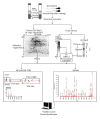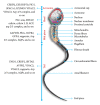Sperm proteomics: road to male fertility and contraception
- PMID: 24363670
- PMCID: PMC3864079
- DOI: 10.1155/2013/360986
Sperm proteomics: road to male fertility and contraception
Abstract
Spermatozoa are highly specialized cells that can be easily obtained and purified. Mature spermatozoa are transcriptionally and translationally inactive and incapable of protein synthesis. In addition, spermatozoa contain relatively higher amounts of membrane proteins compared to other cells; therefore, they are very suitable for proteomic studies. Recently, the application of proteomic approaches such as the two-dimensional polyacrylamide gel electrophoresis, mass spectrometry, and differential in-gel electrophoresis has identified several sperm-specific proteins. These findings have provided a further understanding of protein functions involved in different sperm processes as well as of the differentiation of normal state from an abnormal one. In addition, studies on the sperm proteome have demonstrated the importance of spermatozoal posttranslational modifications and their ability to induce physiological changes responsible for fertilization. Large-scale proteomic studies to identify hundreds to thousands of sperm proteins will ultimately result in the development of novel biomarkers that may help to detect fertility, the state of complete contraception, and beyond. Eventually, these protein biomarkers will allow for a better diagnosis of sperm dysfunctions and aid in drug development. This paper reviews the recent scientific publications available from the PubMed database to address sperm proteomics and its potential application to characterize male fertility and contraception.
Figures



References
-
- Park YJ, Kwon WS, Oh SA, et al. Fertility-related proteomic profiling bull spermatozoa separated by percoll. Journal of Proteome Research. 2012;11(8):4162–4168. - PubMed
-
- Turek PJ. Practical approaches to the diagnosis and management of male infertility. Nature Clinical Practice Urology. 2005;2(5):226–238. - PubMed
-
- Sharlip ID, Jarow JP, Belker AM, et al. Best practice policies for male infertility. Fertility and Sterility. 2002;77(5):873–882. - PubMed
-
- Brewis IA. The potential importance of proteomics to research in reproduction. Human Reproduction. 1999;14(12):2927–2929. - PubMed
Publication types
LinkOut - more resources
Full Text Sources
Other Literature Sources

